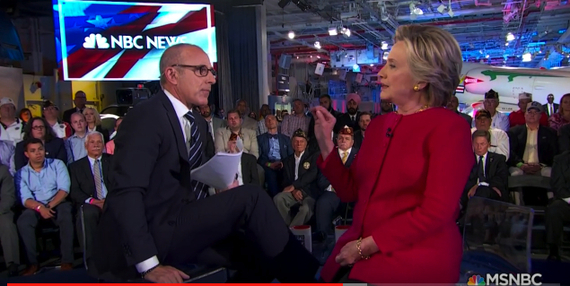Matt Lauer interviews Hillary Clinton − NBC Screenshot photos
NBC NEWS' MATT LAUER is taking heat from some journalists and political partisans for his performance as moderator of NBC/MSNBC's one-hour "Commander-in-Chief Forum" with Hillary Clinton and Donald Trump on Wednesday night.
"Too soft on Trump!" say those who think Lauer spent too few of his 24 minutes with Trump trying to pin him down on specifics − as if Trump were suddenly going to start filling his empty suit with substance.
Lauer's critics were particularly offended that he didn't call out Trump when he falsely claimed − for about the 10,000th time − that he never supported the Iraq war. Never mind that this particular claim has been exposed as a lie 9,999 times, including by a 2002 audio recording of Trump saying he favored invading. Trump keeps repeating the lie anyway.
More relevant to the position Lauer was in on Wednesday's live program is that just moments before Trump's separate segment began, Clinton mentioned during her segment that her opponent always lies about having opposed the Iraq war. She, on the other hand, has admitted her mistake as a senator in 2002 voting to authorize military force in Iraq. Sure enough, after his segment got going, Trump called attention to Clinton's criticism and then lied about Iraq again. Call it 10,001. Was Lauer supposed to echo Clinton's comment and create the impression that he and Clinton were working together to undermine Trump − and lose even more of his fast dwindling minutes in the process?
"Too hard on Clinton!" say those who didn't like Lauer urging Clinton to shorten her answers and beating the e-mail controversy to death.
Let's be honest: Clinton never met a long answer she didn't like, maybe because she knows the nuts and bolts of governance and policy so well and understands, unlike Trump, that details actually matter. But 24 minutes of airtime might as well be a flash of lightning; Lauer was working against a relentless and utterly unforgiving clock.
As for the e-mail questions, if Lauer had succeeded in beating the issue to death, an awful lot of people would've thanked him. To Clinton supporters, its zombie-like refusal to die continues to fuel intense anxiety and even doubt. Of course, to fervent anti-Clinton fantasists, it's the gift that keeps on giving.
CLINTON'S E-MAIL SYSTEM
For her most cranked-up opponents, no scenario involving Clinton is too far-fetched to consider. Thus, it was Clinton the control freak who arrogantly dismissed as "inconvenient" the in-house computer systems at the State Department when she became Secretary of State in 2009. Instead, she made hirelings create a personal e-mail system for her, built around a computer server stashed in the basement of her house in Chappaqua, N.Y. where she could control what it did and didn't do. And because Clinton the elite cares only about personal power and despises America and true Americans, she didn't bother with securing the classified material that filled her unclassified e-mail system.
From that mindset, it's only a tiny stretch to believe that cyber thieves tracked down and cracked open Clinton's unprotected system, snagged more than 250,000 classified State Department cables and made them public, much to the delight of America's adversaries.
Except that's not even close to true.
Those classified State Department cables certainly were stolen and published while Clinton was Secretary, but it had nothing to do with her or her e-mail system. The documents were snatched in 2010 from a Department of Defense database intended to improve the sharing of security information among government agencies after 9/11.
Who took them? A distressed and disgruntled Army private then known as Bradley Manning (now Chelsea Manning, a transgender woman) serving as an intelligence analyst. He used his security clearance to gain access to the database, copied the documents to a small flash drive and provided the information to WikiLeaks. Chelsea Manning was court-martialed, convicted and sentenced to 35 years at the military prison at Fort Leavenworth, Ks.
But surely Clinton's unauthorized basement server provided the cyber highway that invaders took into the State Department's unclassified computer system, which they then infected with viruses. The Wall Street Journal reported the intrusion was so devastating that some intruders were still rummaging around in the system three months later.
That's also part fiction.
The cyber attack happened, all right, and it was devastating, as the Journal reported. But this, too, was unrelated to Clinton or her personal e-mail system. The invasion, most likely by Russians, started long before Clinton took over at State and was part of a broader assault that also got into an unclassified system in the Executive Office of the President at the White House. The hack was discovered in the fall of 2014, more than a year after Clinton and her staff had left the State Department and decommissioned her personal system's Internet domain: clintonemail.com.
Ironically, if Clinton had been using State's supposedly more secure system during her tenure, as her critics say she should have been, her e-mails certainly would have been compromised, classified information would have been lost and her worst fears about preserving the privacy of personal, non-work-related communications would have been realized.
And the State Department is far from alone among government entities that have been the victim of cyber mischief and worse. In the spring of 2015, the U.S. Office of Personnel Management discovered that its "secure" computer system had been penetrated, exposing the personal information of 22 million people, including highly sensitive applications for security clearances. The year before, a cyber intrusion at the U.S. Postal Service affected 800,000 employees and three million customers. And in a 2008 breach at the U.S. Central Command − predating not only Clinton but the entire Obama administration − attackers used a digital worm that spread through military computers and took 14 months to clean out.
HACKING CLINTON'S E-MAIL SYSTEM?
According to a summary of a recently completed FBI investigation into Clinton's use of her personal e-mail system, State Department policies at the time she became Secretary put "no restriction on the use of personal email accounts for official business." But it was discouraged, both for security reasons and because it complicated the retention of government records.
So in this vulnerable, risky real world, how many times was Clinton's private e-mail system hacked? How much damage did Clinton and her State Department staff do to U.S. security interests and the safety of intelligence personnel by being "extremely careless," as FBI Director James Comey has put it, in handling classified information through her personal unclassified system?
So far as FBI investigators have been able to tell, the short answers to those questions are that Clinton's system was never hacked, and that Clinton's handling of classified e-mails through her unclassified system did not damage U.S. interests or jeopardize any intelligence operatives. It's worth noting that the FBI's cyber forensics team is the only group of people who have physically and digitally scrutinized the e-mail issue from the perspective of detached, trained professionals, as opposed to being political partisans engaged in speculation or even distortion for political gain.
Longer answers:
"We did not find direct evidence that Secretary Clinton's personal e-mail domain, in its various configurations since 2008, was successfully hacked," Comey said on July 5, announcing the results of a year-long criminal investigation into Clinton's personal e-mail system and her related handling of classified information. Comey restated that conclusion on July 7 in response to questioning during an interminable appearance before a so-called emergency session of the House Oversight and Government Reform Committee (4 1/2 hours without a break).
Comey took care to add cautionary qualifiers. He said it still was possible that Clinton's system had been hacked by someone or some organization that was clever enough to completely cover its tracks. He also pointed out that some system-related equipment used over the four years of Clinton's tenure had not been available for examination. It had been used until it no longer could be maintained in working order and then was replaced and either recycled or destroyed. Even so, FBI's forensic examiners have proved over time to be tenacious and resourceful enough in other investigations to detect and piece together infinitesimal digital fragments of evidence of intrusions. They apparently found no such indicators in Clinton's system.
HANDLING CLASSIFIED INFORMATION
On September 2, the FBI released a dense, partially redacted 58-page summary of its Clinton investigation. The summary supplemented Comey's announcement in July that he and his investigative team had found insufficient evidence of willful wrongdoing to justify prosecuting Clinton or any senior members of her State Department team.
FBI agents had closely examined some 47,500 e-mails with which Clinton had contact while she was Secretary of State: 30,000 work-related e-mails that Clinton had supplied in response to a State Department request and another 17,500 that FBI investigators had recovered from recipients or through forensic retrieval and reconstruction. Of the 47,500, the FBI determined that 303 − .64 percent of the total reviewed − contained at least some classified material when they were sent or received.
Investigators also found, however, that when Clinton and members of her senior staff were handling these 303 e-mails, none of them bore the header and footer markings that are supposed to identify U.S. documents containing classified information. There were three e-mails − .0064 percent of the total − with only a "(c)" mark next to at least one paragraph, but nothing on the document explaining the symbol's significance. (It means "Confidential," the lowest category of classified material.)
When questioned by FBI agents about several specific e-mails she sent and received that were deemed to have contained at least some classified information at the time, Clinton said several times that she trusted that the people with whom she corresponded, including "experienced foreign service professionals" in her department, knew to not send classified material on an unclassified system. And since the e-mails were not marked as classified, she had no reason to conclude they were, even if the subject matter was sensitive and the wording carefully constructed.
Comey said that he and the experienced team of agents who questioned Clinton concluded that she answered all their questions truthfully.
In his July announcement, Comey pointed out that "even if information is not marked 'classified' in an e-mail, participants who know or should know that the subject matter is classified are still obligated to protect it." He did not explain, however, on what basis people who do not know that specific subject matter is classified, whether they should or not, could act to protect it as such.
Absent that knowledge, absent classified markings and knowing the expertise of the experienced people with whom she was corresponding, it made perfect sense for Clinton to believe − and to state publicly, as she did many times − that she did not send or receive e-mails through her unclassified system that contained classified information.
It turned out she was wrong about that. But life and common sense teaches us that there's a difference between being wrong and not knowing it and knowing what you're saying is wrong and saying it anyway. The former is simply a mistake. The latter is a lie.
Some Republicans are ignoring this elemental distinction when it comes to Clinton. They continue to stridently and repeatedly accuse her not of being mistaken about the classified e-mails but of having lied about them.
It's possible they truly believe that, but the FBI investigation strongly suggests they are mistaken.
It's also possible that they know what they're saying is wrong. But they're saying it anyway.
A version of this column originally was published by the St. Louis Jewish Light.


